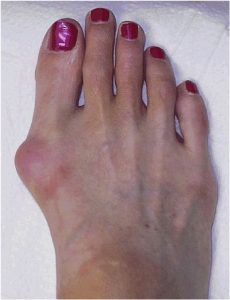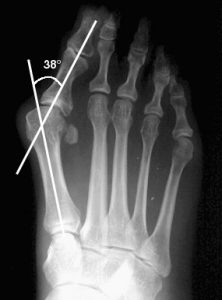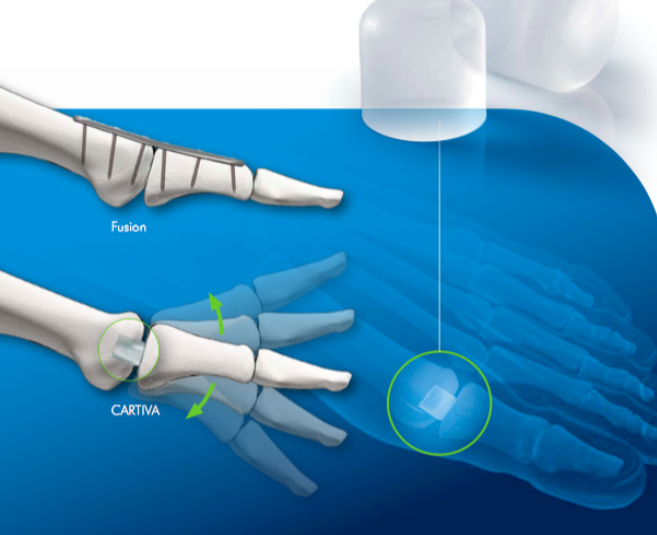Orthopaedics 360
“A Place to Learn”
A bunion, also know as a ‘Hallux valgus deformity’, is a painful deformity that occurs at the base of the big toe (the 1st MTP joint). A complex mechanism results in a painful prominence forming on the inside of the great toe, and the toe itself begins to migrate towards the 2nd toe. Normally the big toe should point forwards. When a bunion develops, the big toe drifts towards the lesser toes. When present, bunions commonly occur in both feet.
Why does a Bunion form
Bunions are more commonly found in women, and there is often a strong history of bunions running in the family. There is no single cause as to why bunions develop in some people and not others. A combination of genetic predisposition, foot shape, and narrow footwear may contribute to symptomatic bunions.
Over time, gradual angulation of the bones occurs, with a stretching of the medial (inner) soft tissues, and contraction of the lateral (outer) soft tissues, resulting in a permanently angulated toe.
Bunions – What Issues can they cause
Do you experience any of these?
Difficulty with footwear
Most patients with symptomatic bunions will experience painful pressure areas over the bony prominence. Difficulty wearing narrow shoes is common. In Severe cases, the bunion can result in lesser toe deformities that also cause callus formation with footwear.
Development of arthritis
Arthritis can develop in patients with underlying bunions. Increased pain and stiffness typically results.
Cosmetic Concerns
As bunions progress with time, cosmesis can become an issue for patients.
Compression of sensory nerves
The deformity can result in loss of function to one of the sensory skin nerves that runs through this region. Patients may experience loss of sensation over the big toe.
Bunions – Myths Exposed
SHARE THIS:
Keyhole Bunion Surgery – Is now the right time
SHARE THIS:
What Imaging is needed
Plain Xrays are all that is required
Plain ‘weight bearing’ xrays are arranged. These allow assessment of the severity of angulation, the presence of any underlying arthritis, and the position of the joints of the lesser toes.
What are the non operative options
Nonoperative treatment of symptomatic bunions is aimed at reducing the pressure going through the foot, and to reduce pressure sores and ulcer formation. This is usually attempted with a change in footwear. ‘Accommodative’ shoes, bunion pads, and orthotics may help relieve the pain.
Keyhole Minimally Invasive Bunion Corrections
Dr. Mike Smith performs ‘Keyhole’ minimally invasive bunion corrections
This technique is used to remove the bunion and straighten the toe. This specialised keyhole technique minimises scarring and usually requires no stitches.
Do you experience any of the following issues with your bunions?
Pain over your bunion
Difficulty wearing shoes
Concerned with your foot’s appearance
Can you have a bunion deformity and still have a straight toe?
Can you have a bunion and still have a straight toe? Bunion deformities are the most common condition that I see and manage. There are two types of ‘bunion’ conditions that I see on a regular basis. The phrase ‘bunion' was originally used to describe a prominence on...
Big toe (1st MTP joint) Arthritis
Orthopaedics 360 "A Place to Learn" Big Toe Arthritis most commonly affects that base of the toe, at the joint called the 1st Metatarsophalangeal (MTP) joint . It is the most common location for arthritis around the foot and ankle, and is typically seen in adults...
Big toe arthritis (1st MTP joint) – What is new on the horizon
Big toe arthritis - What is new on the horizon Big toe arthritis is a common condition that typically affects the 1st metatarsophalangeal (MTP) joint. This frequently leads to pain and swelling in this area, and difficulty ‘pushing off’ when mobilising. Many women...
Disclaimer: Please note that this is general advice only - for more information, please consult your regular doctor, or obtain a referral to see a specialist orthopaedic surgeon.
Orthopaedics 360
Orthopaedics 360
P: (08) 7099 0188
F: (08) 7099 0171
Southern Specialist Centre
Orthopaedics 360
P: (08) 7099 0188
F: (08) 7099 0171
Health @ Hindmarsh
Orthopaedics 360
P: (08) 7099 0188
F: (08) 7099 0171






